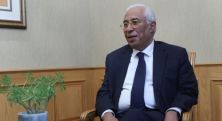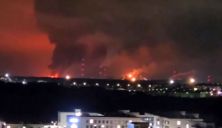The closure of the Bosporus and Dardanelles straits by Turkey, in accordance with the Montreux Convention, at the onset of Russia’s full-scale invasion of Ukraine, prevented the aggressor from leveraging its naval superiority to capture Odesa, Mykolaiv, and other territories.
Ukraine’s Ambassador to Turkey, Vasyl Bodnar, shared this in an interview with Ukrinform.
“One of the key stages in Ukraine’s defense was Turkey’s closure of the Bosporus and Dardanelles straits.
We sank one ‘Moskva,’ while two more Russian cruisers were stuck in the Mediterranean.
I believe that Turkey’s decision to close the straits prevented Russia from using its naval advantage to seize Odesa, Mykolaiv, and other territories, which, according to Moscow’s plans, were to be occupied through sea operations.” he said.
The diplomat also noted that Turkey has become a significant transportation hub for Ukraine. Currently, a transport visa-free regime is in place for Ukrainian carriers.
Beyond maritime restrictions, Turkey has also played a crucial role in facilitating the transit of goods and resources for Ukraine amidst the ongoing war. Ambassador Bodnar highlighted that Turkey has become a major transportation hub, establishing a transport visa-free regime for Ukrainian carriers to streamline logistics and maintain critical supply chains.
Moreover, Turkey’s decision to close the straits aligns with its obligations under the Montreux Convention, which grants Ankara control over the passage of naval vessels during times of war, provided Turkey is not itself a belligerent. By enforcing these provisions, Turkey limited Russia’s ability to deploy additional warships into the Black Sea, effectively isolating its existing fleet. This move not only disrupted Russia’s naval operations but also showcased Turkey’s commitment to maintaining regional stability.
The closure of the straits and Turkey’s broader role in supporting Ukraine highlights its importance in the geopolitical landscape of the Black Sea. The strategic cooperation between Ukraine and Turkey has further extended into sectors like grain exports, with Turkey playing a mediator role in initiatives such as the Black Sea Grain Deal. This underscores the multifaceted nature of Turkish-Ukrainian relations, which continue to evolve amidst the challenges posed by the ongoing conflict.
Turkey’s actions also reflect its nuanced foreign policy, balancing its role as a NATO member while maintaining communication with Russia. This delicate balancing act has allowed Turkey to serve as a mediator in various aspects of the war, from prisoner exchanges to humanitarian corridors, while simultaneously supporting Ukraine’s sovereignty and territorial integrity.
Read also: Biden on Holodomor Memorial Day: U.S. honors Ukraine’s past and stands with it in the present













